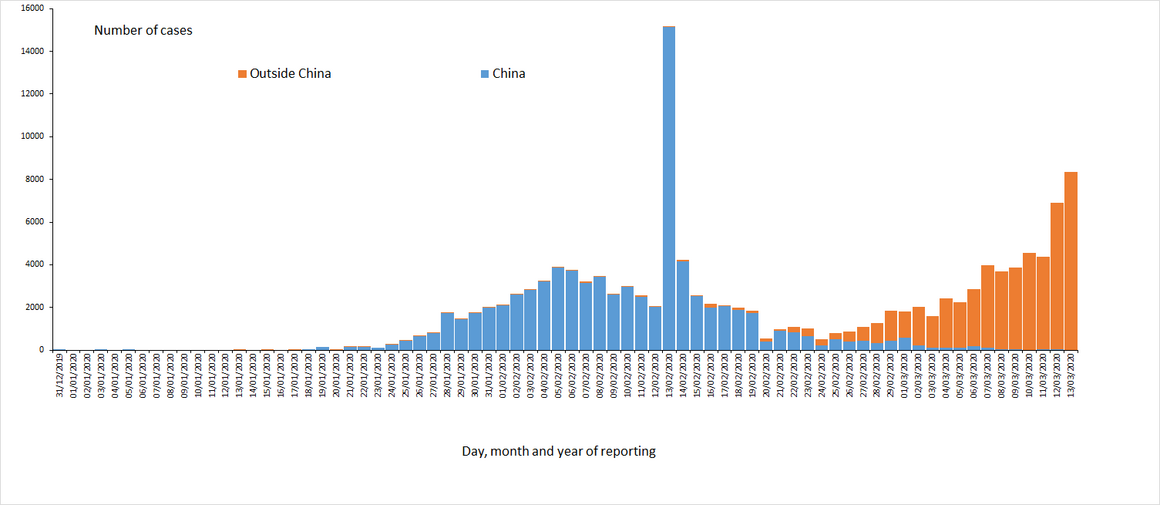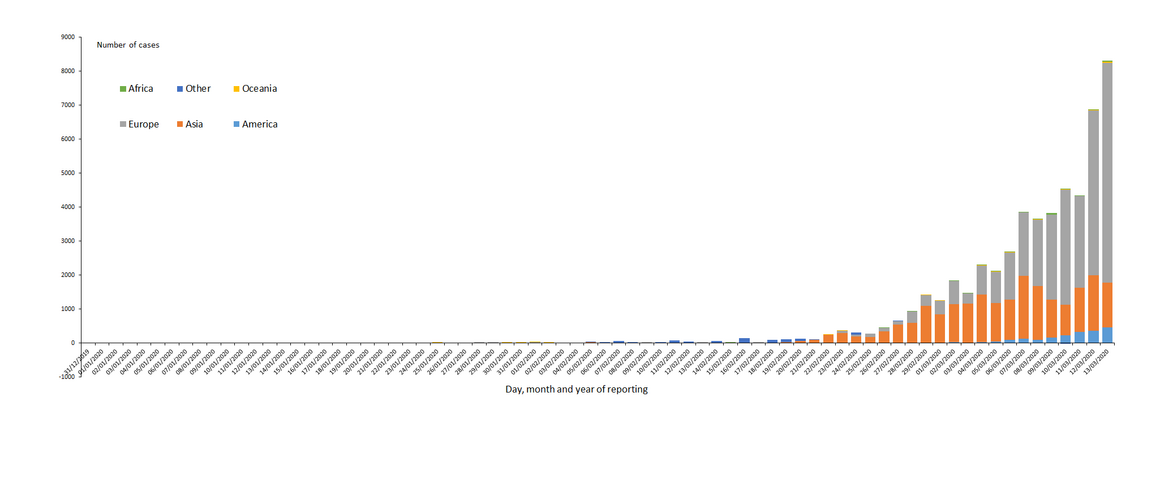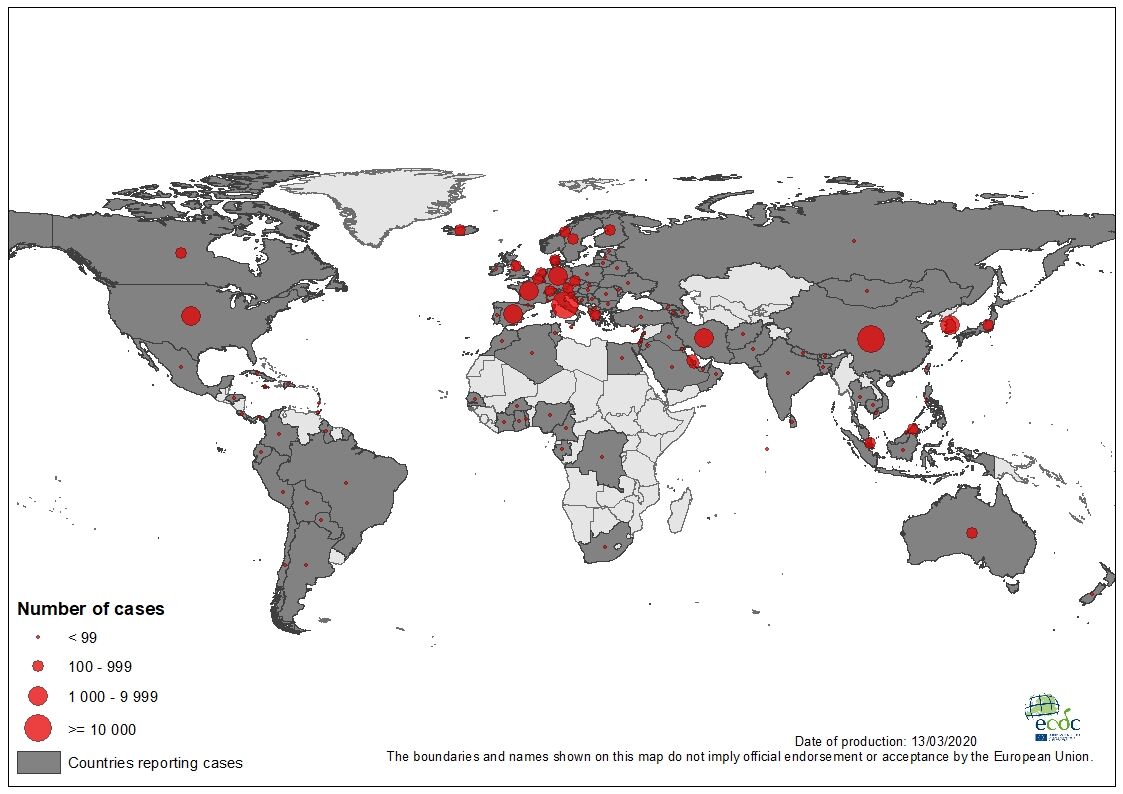The last few months we could not turn our ear to the left or the right or had to hear about the present coronavirus CoViD19.
The global COVID-19 outbreak can now be described as a pandemic.
The World Health Organization (WHO) working with 194 Member States strive to combat diseases – communicable diseases like influenza and HIV, and noncommunicable diseases like cancer and heart disease.
The last few months the WHO was busy monitoring the outbreak of the latest sort of coronavirus. Coronaviruses (CoV) are a large family of viruses that cause illness ranging from the common cold to more severe diseases such as Middle East Respiratory Syndrome (MERS-CoV) and Severe Acute Respiratory Syndrome (SARS-CoV). A novel coronavirus (nCoV) is a new strain that has not been previously identified in humans. It is such new coronavirus CoViD19 which is creating a lot of panics all over the world.
On January 30, 2020, the International Health Regulations Emergency Committee of the World Health Organization declared the outbreak a “public health emergency of international concern”. On January 31, 2020, Health and Human Services Secretary Alex M. Azar II declared a public health emergency (PHE) for the United States to aid the nation’s healthcare community in responding to COVID-19. On March 11, 2020 WHO publicly characterized COVID-19 as a pandemic.

Coronaviruses are zoonotic, meaning they are transmitted between animals and people. Detailed investigations found that SARS-CoV was transmitted from civet cats to humans and MERS-CoV from dromedary camels to humans. Several known coronaviruses are circulating in animals that have not yet infected humans.
Common signs of infection include respiratory symptoms, fever, cough, shortness of breath and breathing difficulties. In more severe cases, infection can cause pneumonia, severe acute respiratory syndrome, kidney failure and even death.
Lots of people are so afraid of the unknown and for death that this unknown new disease frightens them as hell.
Early on, many of the patients at the epicenter of the outbreak in Wuhan, Hubei Province, China had some link to a large seafood and live animal market, suggesting animal-to-person spread. Later, a growing number of patients reportedly did not have exposure to animal markets, indicating person-to-person spread. Person-to-person spread was subsequently reported outside Hubei and in countries outside China, including in the United States. Some international destinations now have apparent community spread with the virus that causes COVID-19, as do some parts of the United States. Community spread means some people have been infected and it is not known how or where they became exposed. Learn what is known about the spread of this newly emerged coronaviruses.
On March the 12th according WHO almost 125,000 cases had been reported to WHO, from 118 countries and territories. In the past two weeks, the number of cases reported outside China had increased almost 13-fold, and the number of affected countries has almost tripled, but today March 13 China could again present lower figures than the previous days.
![Italy coronavirus death toll surges past 1,000: Live updates A worker sanitises Ponte della Paglia bridge on St. Mark's square as a measure to fight against the coronavirus contagion in Venice, Italy [Manuel Silverstri/Reuters]](https://www.aljazeera.com/mritems/imagecache/mbdxxlarge/mritems/Images/2020/3/12/f6df7362e88942b188dce2bb6466430c_18.jpg)
Despite the frequent warnings of the WHO, they are deeply concerned that some countries are not approaching this threat with the level of political commitment needed to control it. What we as citizens can see is that months ago the media made an elephant from a mouse and scared everybody, at the same time having leaders in charge ‘bagatallising’ or downplay, this new illness and telling that they were prepared to tackle it in case an outbreak would reach their country. Because they did not at all seem ready, nor having enough stock, provision of medic material, purveyance to help hospitals and homes, the citizens lost their trust in the parliaments and by going mad, robbing the shops to hoard, they made that those people who were calm until now, could be punished for their calmness and trust in the system. Certainly when today the news spread that the horeca businesses should close their doors from 5 pm tonight and that shops should close for the weekend. Idiotically this meant already the day before yesterday and yesterday hoards of people rushing to the supermarkets, having them drumming together in the waiting cues, creating more possibilities to infect each other, whilst the racks became more and more empty, leaving nothing for other people. This clearly shows how egoistic people are, not thinking about others having a need for those products also. On television, we saw lots of people with their shopping cart overloaded, with loads of toilet paper and other things that a person doesn’t need that much in a moment.
All countries must strike a fine balance between protecting health, preventing economic and social disruption, and respecting human rights. By spreading such a panic as many politicians have done the last few weeks, they are disrupting the whole system and bringing more danger to the people and to the economy.
We must sincerely look at the numbers and compare it percentages with the ordinary flue which produces many more deaths per year than this virus has done for the moment. People also have to remember that there are still 77 countries and territories with no reported cases, and 55 countries and territories that have reported 10 cases or less. And all countries with cases have unaffected areas.
As of 13 March in numbers:

Italy (15 113), Spain (3 004), France (2 876), Germany (2 369), Switzerland (854), Denmark (676), Norway (621), Sweden (620), Netherlands (614), United Kingdom (590), Belgium (399), Austria (361), Finland (155), Greece (133), Iceland (117), Czech Republic (116), Slovenia (96), Portugal (78), Ireland (70), San Marino (67), Romania (64), Poland (49), Russia (34), Estonia (27), Luxembourg (26), Croatia (25), Georgia (25), Serbia (24), Albania (23), Bulgaria (23), Belarus (21), Slovakia (21), Hungary (16), Latvia (16), Azerbaijan (13), Bosnia and Herzegovina (11), Malta (9), North Macedonia (9), Armenia (6), Cyprus (6), Moldova (6), Liechtenstein (4), Lithuania (3), Ukraine (3), Turkey (2), Andorra (1), Holy See (1) and Monaco (1).
In the world

Pandemics happen when a new virus emerges to infect people and can spread between people sustainably. Because there is little to no pre-existing immunity against the new virus, it spreads worldwide. You have an opportunity to keep it that way. Prepare yourself and the people around you and your health facilities.
It is true that you can’t fight a virus if you don’t know where it is. That means robust surveillance to find, isolate, test and treat every case, to break the chains of transmission is important.
To save lives we must reduce transmission. That means finding and isolating as many cases as possible, and quarantining their closest contacts. Even if you cannot stop transmission, you can slow it down and protect health facilities, old age homes and other vital areas – but only if you test all suspected cases.
There are enough simple matters each of us can do.
Everyone can contribute to the fight against the coronavirus. On the one hand to slow down the spread of the virus and on the other hand to protect the vulnerable people in our country.
Standard recommendations to prevent infection spread include
- Regular hand washing,
- Covering mouth and nose when coughing and sneezing,
- No handkerchief? Cough or sneeze into your elbow cavity
- Use a new tissue paper each time and dispose of it in a lockable trash can.
- Taking normal hygienic measures
- Avoid personal close contact with others. As such do not give kisses or hands, or no hugging to say hello or goodbye for example.
- Thoroughly cooking meat and eggs.
- Avoiding crowded warm damp places
- Avoiding close contact with anyone showing symptoms of respiratory illness such as coughing and sneezing.
- Stay home if you are ill
- Be attentive to risk groups (persons over 65 years of age, diabetics, persons with heart, lung or kidney diseases, persons with a weakened immune system, …).
- Use your bank card or your bank application or internet banking as much as possible. This way you avoid contact with cash and the ATM.
What we are currently seeing at the Stock Exchange is clearly a random sale of all the securities, regardless of whether or not they are affected more or less by the crisis, and probably amplified by automatic sales programs. After all, we live in a world where computers and algorithms strengthen market trends in the short term, up or down.
It is indeed difficult to continue to follow a rational vision and to take the necessary distance when the media rages and spreads panic messages all around you. But here too, the fear took many which resulted in an absurd drop.
**
Those who believe in God, should trust Him, but should also live according to His rules and given regulations for our way of living. God’s son also asked to take notice of all those around us and to protect and help them. Therefore, we should protect them by ourselves living according the hygienic prescriptions given in the Bible and keeping to the advice given by the health department of our country. At the same time, we should never use more of the material goods, like toilet paper, paper tissues, food, a.o. then we normally need. Rationing or taking in more products in the house than we normally need is not in accordance to our attitude against our neighbour nor the right attitude in trusting that God would provide for what one needs.
Please let us keep our heads cool and not panic. Help also others to see clearly and take their unfounded fear away.
+
Please find also to read
- Coronavirus Disease (COVID-19) – Research and Statistics
- Timeline: How the new coronavirus spread
- Coronavirus: Which countries have confirmed cases?
- What happens if you catch the new coronavirus?
- Coronavirus confirmed as pandemic by World Health Organization
- Situation update worldwide, as of 13 March


[…] to contain the spread of coronavirus, which has so far claimed more than 1,000 lives and infected more than 15 113 people in the country when I wrote my previous article on this virus, having today recorded its highest daily toll yet. There were 250 deaths recorded over the past 24 […]
LikeLike
[…] Europe in Chaos for a Pandemic […]
LikeLike
[…] Europe in Chaos for a Pandemic […]
LikeLike
[…] Europe in Chaos for a Pandemic […]
LikeLike
[…] Europe in Chaos for a Pandemic […]
LikeLike
[…] Europe in Chaos for a Pandemic […]
LikeLike
[…] Europe in Chaos for a Pandemic […]
LikeLike
[…] Europe in Chaos for a Pandemic […]
LikeLike
[…] Europe in Chaos for a Pandemic […]
LikeLike
[…] Europe in Chaos for a Pandemic […]
LikeLike
[…] Europe in Chaos for a Pandemic […]
LikeLike
[…] Europe in Chaos for a Pandemic […]
LikeLike
[…] Europe in Chaos for a Pandemic […]
LikeLike
[…] Europe in Chaos for a Pandemic […]
LikeLike
[…] Europe in Chaos for a Pandemic […]
LikeLike
[…] Europe in Chaos for a Pandemic […]
LikeLike
[…] Europe in Chaos for a Pandemic […]
LikeLike
[…] Europe in Chaos for a Pandemic […]
LikeLike
[…] Europe in Chaos for a Pandemic […]
LikeLike
[…] Europe in Chaos for a Pandemic […]
LikeLike
[…] Europe in Chaos for a Pandemic […]
LikeLike
[…] Europe in Chaos for a Pandemic […]
LikeLike